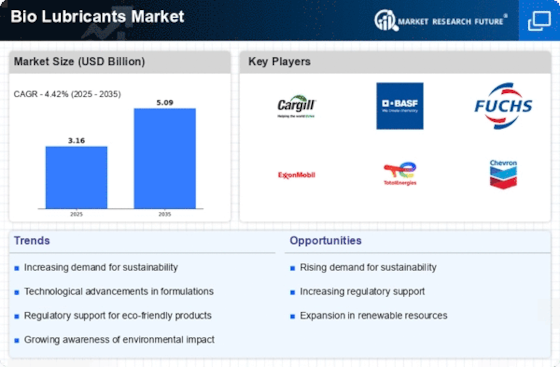Top Industry Leaders in the Bio lubricants Market
 The bio-lubricants market is churning, fueled by environmental concerns and rising demand for sustainable alternatives to petroleum-based lubricants. With a projected CAGR of over 4%, this market promises exciting growth, but the competition is fierce. Let's delve into the strategies adopted by key players, the factors influencing market share, and the latest industry developments.
The bio-lubricants market is churning, fueled by environmental concerns and rising demand for sustainable alternatives to petroleum-based lubricants. With a projected CAGR of over 4%, this market promises exciting growth, but the competition is fierce. Let's delve into the strategies adopted by key players, the factors influencing market share, and the latest industry developments.
Competitive Strategies:
-
Innovation: Companies like Exxon Mobil and Chevron are investing heavily in research and development, creating high-performance, niche bio-lubricants for specific applications. -
Partnerships: Collaborations between bio-based feedstock producers and lubricant manufacturers are fostering supply chain efficiency and market reach. For instance, TotalEnergies partnered with Musim Masco for rapeseed oil-based lubricants in Southeast Asia. -
Sustainability Branding: Highlighting the environmental benefits of bio-lubricants through certifications, life cycle assessments, and green marketing campaigns is crucial to attracting eco-conscious consumers. -
Acquisitions and Mergers: Mergers like the recent one between Green Grease and Environmental Lubricants aim to consolidate market share and expand product portfolios.
Factors Influencing Market Share:
-
Cost Competitiveness: While bio-lubricants are gaining traction, their higher price compared to traditional lubricants remains a hurdle. Cost optimization through feedstock sourcing and technological advancements is key. -
Government Regulations: Stringent environmental regulations in Europe and North America are driving the adoption of bio-lubricants. For example, the EU's Renewable Energy Directive 2022 mandates a minimum 2% blend of bio-lubricants in certain fuels by 2030. -
End-Use Industry Trends: The automotive and industrial sectors are the largest consumers of bio-lubricants. Growing demand for electric vehicles and advancements in renewable energy technologies might impact the market in the long term. -
Regional Dynamics: Europe currently dominates the bio-lubricants market, but Asia-Pacific is expected to witness the fastest growth due to increasing industrialization and environmental awareness.
Key Companies in the Bio-lubricants Market Include
- Shell plc
- BP p.l.c.
- TotalEnergies SE
- ExxonMobil Corporation
- Fuchs Petrolub SE
- Novvi LLC
- Emery Oleochemicals
- BIONA JERSÍN s.r.o.
- MO8 Specialities Limited
- RSC Bio Solutions
- BECHEM
- IGOL
Recent Developments:
BP acquired 30% shareholding in Green Biofuels Ltd in February 2022 and will partner on decarbonizing construction, freight transport, off-road machinery operations, and shipping. Renewable hydrogenated vegetable oil (HVO) fuels from green biofuels can be utilized as a direct replacement for diesel.
Neste, which is a known oil refiner, partnered with Hesburger, a popular Finnish chain restaurant, in October 2021, where they collected used cooking oil from over three hundred neighborhood restaurants. These will be used to produce renewable diesel and bio-lubricants. Additionally, the restaurants will run their whole fleet on Neste's MY Renewable Diesel in Finland.
April 2023 saw Exxon Mobil announced their lube blending plant investment plan in India, valued at roughly 110 million US dollars. The facility is scheduled to start its operations before the end of the year 2015. According to ExxonMobil’s estimates, this plant can produce about 159 million liters per annum of finished lubricants. This input is geared towards creating demand for locally produced goods, especially those from the steel, power mining and construction sectors and commercial and passenger motor vehicles.
November 2022: Shell signed an agreement to acquire the Environmentally Considerate Lubricants (ECLs) business of the PANOLIN Group. A portfolio of products for hydraulics, gears, universal tractor transmission oils, biodegradable engine oils (HDEO), turbine oils, chainsaw oils, and greases for machine lubrication are also included. This includes the PANOLIN brand, ECL product formulations, intellectual property, technical expertise, and technology. The acquisition increases Shell’s presence in the mining, construction, agriculture, renewable power, hydropower, and offshore wind sectors. The deal is expected to be completed by early 2023.
December 2021: RSC Bio Solution and Standard Sekiyu Osaka Hatsubaisho Co., ltd enter latest distribution partnership to meet growing demand for environmentally acceptable lubricants (EALs) in Japan serving industrial and marine applications announced.
On February 2023, Green Earth Lubricants also, another top-notch manufacturer of bio-lubricants, launched its new range of industrial sector-based bio-lubricants. This new range has been developed for use under tough application conditions commonly found in industries and is environmentally friendly.
In November 2022, Wholly owned Shell plc subsidiaries in Switzerland, the United Kingdom, the United States, and Sweden signed agreements to acquire Panolin Group’s environmentally conscious lubes (ECLs) business. This comes with an offering of biodegradable lubricants.










